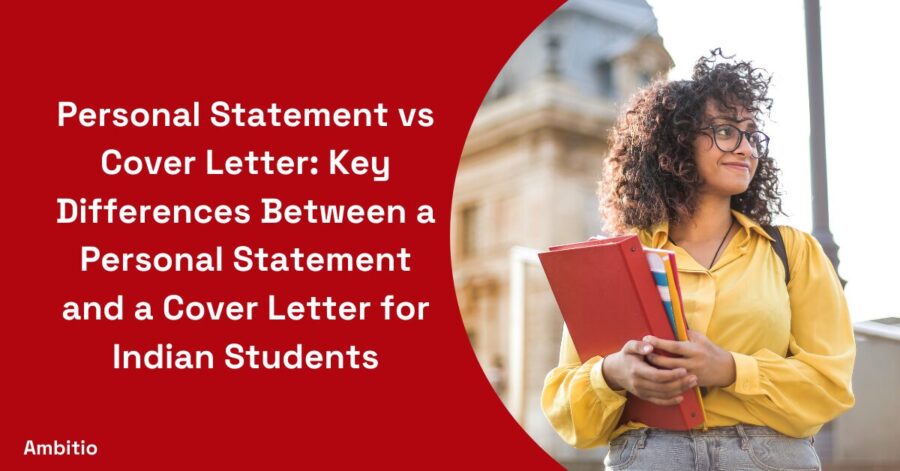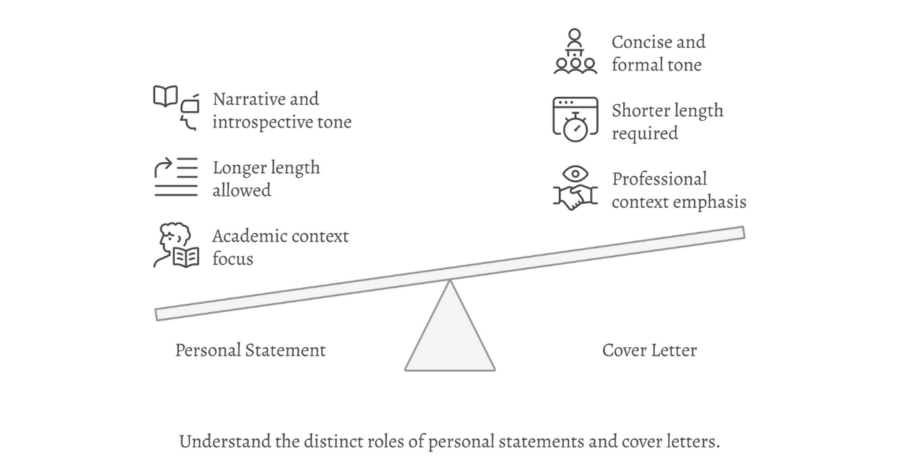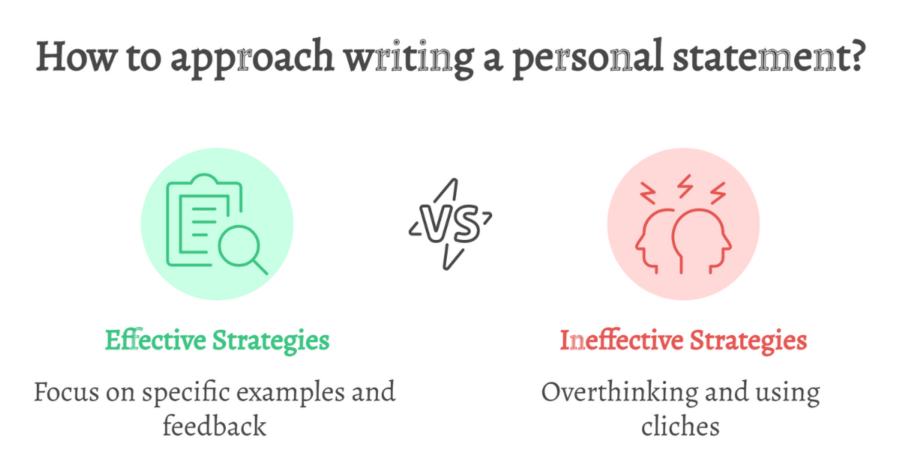10 May 2025
5 minutes read
Personal Statement vs Cover Letter: Key Differences Between a Personal Statement and a Cover Letter for Indian Students

Key Takeaways
- Personal statement vs cover letter: Understand their unique roles in applications for academic programs and jobs, and boost your chances of success.
- Personal statement vs cover letter: Learn how each document showcases your skills and experience for specific programs or job roles effectively.
- Personal statement vs cover letter: Explore how to tailor these documents to highlight qualifications, career goals, and fit for your desired opportunity.
If you are an Indian student looking forward to undergraduate or a graduate degree outside India, chances are that you’ve encountered the terms “personal statement” and “cover letter.” They seem identical on the surface, two versions of one and the same story.
But the thing is, they are for different purposes and need to be addressed differently. They cannot be replaced with each other. Indeed, mixing the two up might have a huge impact on your job or university application.
Although they both emphasize your experience and skill, the tone, content, and context are quite different. A personal statement goes in-depth into your individual experience, whereas a cover letter is specific to the job or academic opportunity.
Knowing the difference will help you boost your odds of impressing a prospective employer or an admissions committee. Let’s deconstruct the distinction between a personal statement and a cover letter so that you can ace both.
What is the Purpose of a Personal Statement?
A personal statement is commonly utilized in academic settings, usually as part of graduate and professional school applications. It’s your story—a narrative and reflective piece that demonstrates your motivation, interest in the field, long-term objectives, and research interests.

Unlike a cover letter, which is brief and written specifically for the job, a personal statement provides more insight into your background, values and skills. It’s a sample of your writing and organizational skills and should be tailored to the specific program or position you’re applying to.
Indian students applying to programs in the USA, UK or Canada should know that a well-crafted personal statement is usually required for an MBA program, postgraduate studies, or even undergraduate courses. It’s your turn to highlight your strengths, work experience, and experience relevant to the job so that it projects a complete image of you.
What Does a Cover Letter Focus on?
Interesting fact: The word “cover letter” came from the actual cover page of a CV or resume. But there’s more to it than being simply a letter that accompanies your resume.
A cover letter is used to apply for a job or internship and focuses on:
- Explaining your qualifications and fit for the specific job role
- Demonstrating how your skills match the job requirements
- Highlighting your skills and experience related to the job description
- Tailoring each document to the position you are applying for
- Capturing the reader’s attention within one page
It’s a formal letter that is crafted to the specific role and company, and it’s your tool for generating interest and securing an interview. Cover letter highlights your strengths while making you seem well-suited for a particular role.
Cover Letter vs Personal Statement: Key Differences
Here’s something cool: Although both a cover letter and a personal statement aim to showcase your qualifications, they serve different purposes and are used in different scenarios.

The difference between a personal statement and a cover letter boils down to their intent and audience.
- A personal statement is narrative and introspective; a cover letter is concise and professional
- Personal statements are usually required by graduate and professional schools; cover letters are used in professional contexts
- A personal statement shares your personal journey and academic goals; a cover letter focuses on job requirements and your professional fit
- Personal statements are often one to two pages; cover letters are one page
- A cover letter is crafted to a specific job; a personal statement is catered to a specific academic program
Quick Comparison Table:
| Feature | Personal Statement | Cover Letter |
|---|---|---|
| Context | Academic | Professional (Job or Internship) |
| Length | 1-2 pages | One page |
| Tone | Narrative, introspective | Concise, formal |
| Purpose | Showcase academic goals and personal story | Align skills with job requirements |
| Tailoring | To specific program | To particular job |
| Use | Graduate, MBA, postdoc position | Applying for jobs and internships |
Why Do You Need Statements of Purpose, Personal Statements and Cover Letters?
Fun fact: Some universities and employers require all three—each serving a unique role in crafting effective application materials.
Each document helps present a different side of you:
- Statements of purpose explain research projects and academic and career goals
- Personal statements highlight your personal journey and values
- Cover letters are tailored to the job and showcase your strengths
- SOPs are more structured and formal than personal statements
- Cover letters help you explain your fit for a specific role and increase your chances of securing an interview
Together, these documents create a fuller picture of your qualifications and fit for a program or position.
Top 10 Universities With Personal Statement and Cover Letter Requirements
Fun fact: Ivy League and top-tier schools often list a cover letter or personal statement as a mandatory part of your application—sometimes both!
Here’s a handy table for top universities in the USA, UK, and Canada:
| Sl. No | University Name | Fee (USD) | Program Offered | Personal Statement Requirement | Cover Letter Requirement |
| 1 | Harvard University (USA) | 85,000 | MBA Program | Required | Optional |
| 2 | University of Oxford (UK) | 75,000 | Graduate Program | Required | Required |
| 3 | University of Toronto (Canada) | 100,000 | Undergraduate & Postgraduate | Required | Optional |
| 4 | Stanford University (USA) | 125,000 | Graduate Studies | Required | Required |
| 5 | University of Cambridge (UK) | 70,000 | Postdoc Position | Required | Required |
| 6 | McGill University (Canada) | 90,000 | Undergraduate Studies | Required | Optional |
| 7 | MIT (USA) | 75,000 | Research Program | Required | Required |
| 8 | University College London (UK) | 80,000 | Graduate Program | Required | Required |
| 9 | University of British Columbia | 95,000 | MBA Program | Required | Optional |
| 10 | Yale University (USA) | 105,000 | Graduate Program | Required | Optional |
Conclusion
The fine but crucial distinction between a cover letter and a personal statement is the key to a successful application submission to a potential employer.
Whereas a personal statement enables you to give a detailed picture of your academic and personal history, a cover letter is a brief, formal letter written specifically for a job. Both are important in job, graduate school, or internship application.
Being effective in application materials requires knowing which document to use, when, and how. So if you’re writing a personal statement for your GRE, GMAT, ACT, IELTS, TOEFL, or SAT-bound program, or composing a cover letter for a job application, invest the time to customize your message, emphasize your experience and abilities, and indicate why you’re an ideal match.
Let your statement and a cover letter combine to increase your chances! For expert guidance, choose Ambitio!
FAQs
What is the main difference in purpose between a personal statement vs cover letter?
The main difference in purpose between a personal statement vs cover letter is that a personal statement focuses on academic goals and personal journey, while a cover letter is tailored to a specific job and highlights professional qualifications.
When should I use a personal statement vs cover letter for my application?
You should use a personal statement vs cover letter when applying for graduate or undergraduate programs that require introspective narratives; use a cover letter when applying for a job or internship.
Is a personal statement vs cover letter better for showcasing research interests?
A personal statement vs cover letter is better for showcasing research interests, especially in academic applications, because it allows more space for detail and a deeper narrative.
Can I submit a personal statement vs cover letter for a job application?
While it’s not standard to submit a personal statement vs cover letter for a job application, some roles in education or research may request one to evaluate your academic motivation and writing skills.
How long should a personal statement vs cover letter typically be?
A personal statement vs cover letter typically ranges from one to two pages for the statement, while the cover letter is concise and limited to one page.
What skills should be emphasized in a personal statement vs cover letter?
In a personal statement vs cover letter, focus on long-term goals and academic motivation in the former, while emphasizing job-related skills and experience in the latter.
Do universities ask for a personal statement vs cover letter for undergraduate admissions?
Yes, some universities ask for a personal statement vs cover letter for undergraduate admissions, particularly in the UK and Canada, to assess both academic intent and professional fit.

You can study at top universities worldwide!
Get expert tips and tricks to get into top universities with a free expert session.
Book Your Free 30-Minute Session Now! Book a call now




























